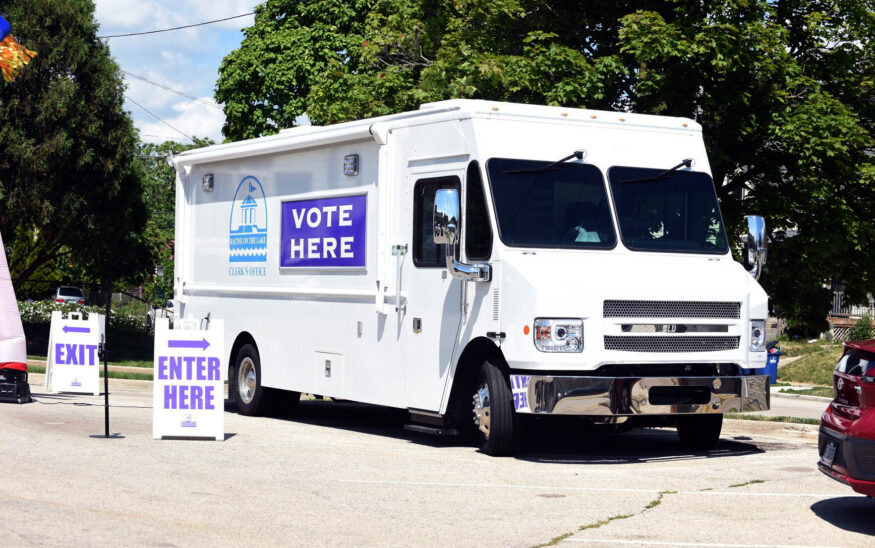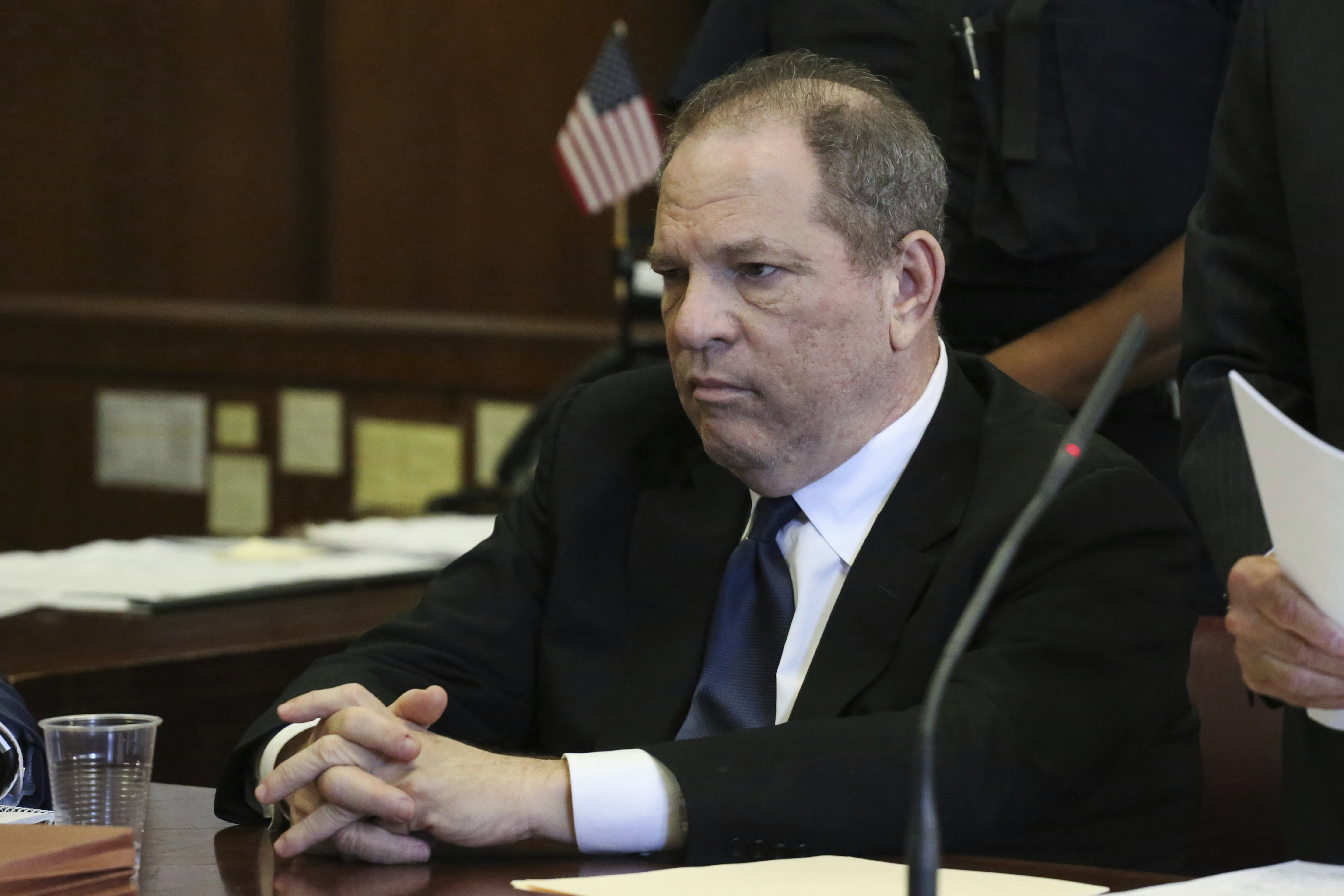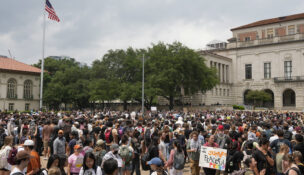Wisconsin judge rules that absentee voting van used in 2022 was illegal
By: Associated Press//January 11, 2024//
Wisconsin judge rules that absentee voting van used in 2022 was illegal
By: Associated Press//January 11, 2024//
MADISON, Wis. (AP) — A Wisconsin judge has ruled that state law does not allow the use of mobile absentee voting sites, siding with Republicans who had challenged Racine’s use of a voting van that traveled around the city in 2022.
Republicans opposed the use of the van, the only one of its kind in Wisconsin, saying its use was against the law, increased the chances of voter fraud and was used to bolster Democratic turnout.
Racine officials, the Democratic National Committee and the Milwaukee-based voting advocacy group Black Leaders Organizing for Communities refuted those claims and defended the legality of the van, saying there was no specific prohibition against it.
The lawsuit over the mobile voting van is one of several in battleground Wisconsin that could affect voting rules in the upcoming presidential election.
The van was first used in Racine’s municipal elections in 2022. It was purchased with grant money Racine received from the Center for Tech and Civic Life, the nonprofit funded by Facebook founder Mark Zuckerberg and his wife. Republicans have been critical of the grants, calling the money “Zuckerbucks” that they say was used to tilt turnout in Democratic areas.
The van was used only to facilitate early in-person voting during the two weeks prior to an election, Racine City Clerk Tara McMenamin said. She said the vehicle was useful because it was becoming too cumbersome for her staff to set up their equipment in remote polling sites.
It traveled across the city to meet voters in their neighborhoods and collect early ballots.
The Wisconsin Institute for Law and Liberty, on behalf of Racine County Republican Party Chairman Ken Brown, filed a complaint the day after the August 2022 primary with the Wisconsin Elections Commission, arguing that the van was against state law. They argued that it was only sent to Democratic areas in the city in an illegal move to bolster turnout.
McMenamin disputed those accusations, saying that it shows a misunderstanding of the city’s voting wards, which traditionally lean Democratic.
The elections commission dismissed the complaint four days before the November election that year, saying that there was no probable cause shown to believe the law had been broken. That led the Wisconsin Institute for Law and Liberty to then file its lawsuit.
Racine County Circuit Judge Eugene Gasiorkiewicz, in a ruling late Monday, overturned the elections commission’s dismissal of the complaint, saying state election laws do not allow for the use of mobile voting sites.
“Nowhere can this Court find or has been provided any authority allowing the use of a van or vehicle as an alternate absentee voting vehicle,” the judge wrote.
He rejected the argument from defendants that the use of mobile voting sites was allowable because there is no specific prohibition against them.
The judge said his ruling wasn’t a determination on whether mobile voting sites were a good idea or not. That is up to the Legislature to decide, Gasiorkiewicz said.
The Wisconsin Elections Commission and the state Department of Justice, which represented it in the lawsuit, did not return messages seeking comment on whether the decision will be appealed. McMenamin said the decision was being reviewed and next steps would be more clear next week.
Early in-person absentee voting in Wisconsin for the municipal spring election begins Feb. 6. The presidential primary is April 2, with absentee voting allowed two weeks before it.
If appealed, the case could ultimately be decided by Wisconsin’s liberal-controlled state Supreme Court.
Lucas Vebber, deputy counsel at the Wisconsin Institute for Law and Liberty, hailed the ruling.
“Wisconsin voters should know that their elections are secure, and that election administration does not favor one political party over another,” Vebber said. “This decision does just that.”
Legal News
- Questions of transparency, leadership responsibility linger over State Bar trust
- Firm demands $4.3M in dispute with Wisconsin client
- Chesebro among those charged with interfering in 2020 election
- Williams-Sonoma must pay almost $3.2 million for violating FTC’s ‘Made in USA’ order
- Harvey Weinstein due back in court, while a key witness weighs whether to testify at a retrial
- Protests erupt on college campuses throughout Midwest, and U.S. over war in Gaza
- Flight attendant indicted in attempt to record girl in airplane bathroom
- Wisconsin attorney loses law license, ordered to pay $16K fine
- Former Wisconsin police officer charged with 5 bestiality felony counts
- Judge reject’s Trump’s bid for a new trial in $83.3 million E. Jean Carroll defamation case
- Dozens of deaths reveal risks of injecting sedatives into people restrained by police
- The Latest: Supreme Court arguments conclude in Trump immunity case
WLJ People
- Power 30 Personal Injury Attorneys – Russell Nicolet
- Power 30 Personal Injury Attorneys – Benjamin Nicolet
- Power 30 Personal Injury Attorneys – Dustin T. Woehl
- Power 30 Personal Injury Attorneys – Katherine Metzger
- Power 30 Personal Injury Attorneys – Joseph Ryan
- Power 30 Personal Injury Attorneys – James M. Ryan
- Power 30 Personal Injury Attorneys – Dana Wachs
- Power 30 Personal Injury Attorneys – Mark L. Thomsen
- Power 30 Personal Injury Attorneys – Matthew Lein
- Power 30 Personal Injury Attorneys – Jeffrey A. Pitman
- Power 30 Personal Injury Attorneys – William Pemberton
- Power 30 Personal Injury Attorneys – Howard S. Sicula












